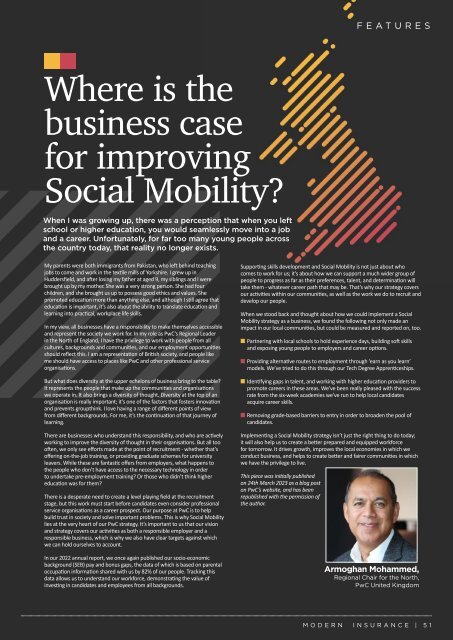Modern Insurance Magazine Issue 61
Create successful ePaper yourself
Turn your PDF publications into a flip-book with our unique Google optimized e-Paper software.
FEATURES<br />
Where is the<br />
business case<br />
for improving<br />
Social Mobility?<br />
When I was growing up, there was a perception that when you left<br />
school or higher education, you would seamlessly move into a job<br />
and a career. Unfortunately, for far too many young people across<br />
the country today, that reality no longer exists.<br />
My parents were both immigrants from Pakistan, who left behind teaching<br />
jobs to come and work in the textile mills of Yorkshire. I grew up in<br />
Huddersfield, and after losing my father at aged 9, my siblings and I were<br />
brought up by my mother. She was a very strong person. She had four<br />
children, and she brought us up to possess good ethics and values. She<br />
promoted education more than anything else, and although I still agree that<br />
education is important, it’s also about the ability to translate education and<br />
learning into practical, workplace life skills.<br />
In my view, all businesses have a responsibility to make themselves accessible<br />
and represent the society we work for. In my role as PwC’s Regional Leader<br />
in the North of England, I have the privilege to work with people from all<br />
cultures, backgrounds and communities, and our employment opportunities<br />
should reflect this. I am a representation of British society, and people like<br />
me should have access to places like PwC and other professional service<br />
organisations.<br />
But what does diversity at the upper echelons of business bring to the table?<br />
It represents the people that make up the communities and organisations<br />
we operate in. It also brings a diversity of thought. Diversity at the top of an<br />
organisation is really important; it’s one of the factors that fosters innovation<br />
and prevents groupthink. I love having a range of different points of view<br />
from different backgrounds. For me, it’s the continuation of that journey of<br />
learning.<br />
There are businesses who understand this responsibility, and who are actively<br />
working to improve the diversity of thought in their organisations. But all too<br />
often, we only see efforts made at the point of recruitment - whether that’s<br />
offering on-the-job training, or providing graduate schemes for university<br />
leavers. While these are fantastic offers from employers, what happens to<br />
the people who don’t have access to the necessary technology in order<br />
to undertake pre-employment training? Or those who didn’t think higher<br />
education was for them?<br />
There is a desperate need to create a level playing field at the recruitment<br />
stage, but this work must start before candidates even consider professional<br />
service organisations as a career prospect. Our purpose at PwC is to help<br />
build trust in society and solve important problems. This is why Social Mobility<br />
lies at the very heart of our PwC strategy. It’s important to us that our vision<br />
and strategy covers our activities as both a responsible employer and a<br />
responsible business, which is why we also have clear targets against which<br />
we can hold ourselves to account.<br />
In our 2022 annual report, we once again published our socio-economic<br />
background (SEB) pay and bonus gaps, the data of which is based on parental<br />
occupation information shared with us by 82% of our people. Tracking this<br />
data allows us to understand our workforce, demonstrating the value of<br />
investing in candidates and employees from all backgrounds.<br />
Supporting skills development and Social Mobility is not just about who<br />
comes to work for us; it’s about how we can support a much wider group of<br />
people to progress as far as their preferences, talent, and determination will<br />
take them - whatever career path that may be. That’s why our strategy covers<br />
our activities within our communities, as well as the work we do to recruit and<br />
develop our people.<br />
When we stood back and thought about how we could implement a Social<br />
Mobility strategy as a business, we found the following not only made an<br />
impact in our local communities, but could be measured and reported on, too.<br />
n Partnering with local schools to hold experience days, building soft skills<br />
and exposing young people to employers and career options.<br />
n Providing alternative routes to employment through ‘earn as you learn’<br />
models. We’ve tried to do this through our Tech Degree Apprenticeships.<br />
n Identifying gaps in talent, and working with higher education providers to<br />
promote careers in these areas. We’ve been really pleased with the success<br />
rate from the six-week academies we’ve run to help local candidates<br />
acquire career skills.<br />
n Removing grade-based barriers to entry in order to broaden the pool of<br />
candidates.<br />
Implementing a Social Mobility strategy isn’t just the right thing to do today;<br />
it will also help us to create a better prepared and equipped workforce<br />
for tomorrow. It drives growth, improves the local economies in which we<br />
conduct business, and helps to create better and fairer communities in which<br />
we have the privilege to live.<br />
This piece was initially published<br />
on 24th March 2023 as a blog post<br />
on PwC’s website, and has been<br />
republished with the permission of<br />
the author.<br />
Armoghan Mohammed,<br />
Regional Chair for the North,<br />
PwC United Kingdom<br />
MODERN INSURANCE | 51
















